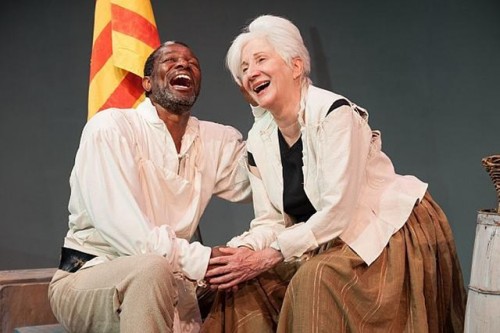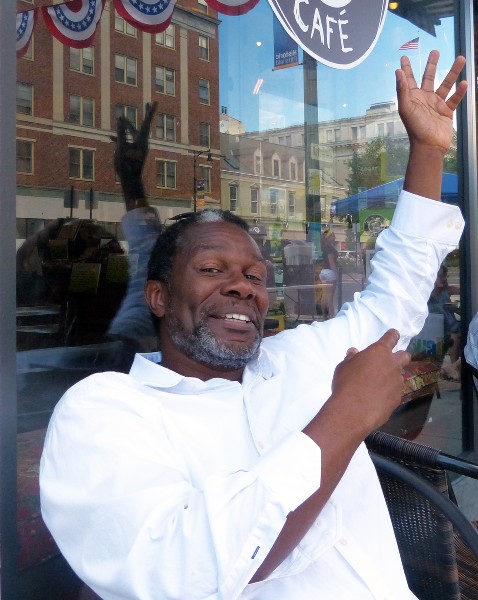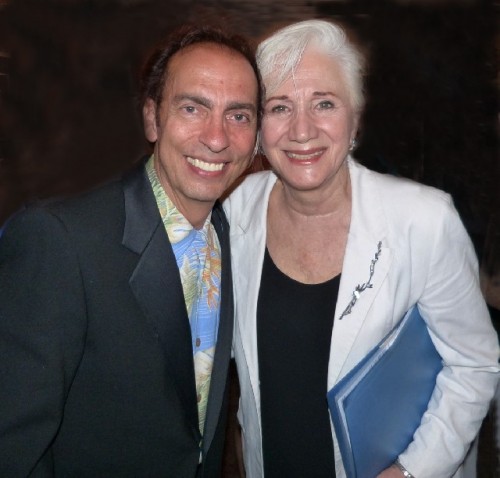John Douglas Thompson on Brecht
Performing with Olympia Dukakis in Mother Courage
By: Charles Giuliano and John Douglas Thompson - Aug 21, 2013
Initially I transcribed and posted this second part of an interview with John Douglas Thompson. After reading it he sent a note asking to take it down until we had time to review it. He had concerns and misgivings about his statements about performing Brecht.
As a reflection of the collaboration that has developed in the past few years we agreed to revise the text. This is a most unusual process in journalism. It is why it has evolved from question and answer interviews to a true collaboration.
It was intriguing that the text of the initial dialogue, over lunch, led him to rethink the concept of Epic Theatre and performing plays by Brecht.
He expressed that the role of The Cook in Mother Courage was particularly challenging. He discussed similar misgivings about other roles. He suggests that this as a topic for a later time. It would be what he describes as an “aftermath” project.
What follows is a revised text to our mutual satisfaction. It has taken the initial discourse to another level.
Charles Giuliano Let’s explore the concept of Bertolt Brecht’s Epic Theatre. How did (director) Tony (Simotes) interpret that? What did you do in the role that was different?
John Douglas Thompson You have to start with the translations which are very important because Mother Courage was written in German. The most popular translation is Eric Bentley’s. That’s the one we used. You have to get your mouth around those words and ideas. So I didn’t go into this as a different way of performing which in hindsight I now believe is a problem. Because I think there is something to Brecht’s alienation and Epic Theatre performance style. Without clear understanding of that I feel that I’m just playing in the dark. Hopefully for my next Brecht play I can learn to adapt a more Brechtian style of performance. I just go at it the same way I would go at Shakespeare. The idea of alienation and Epic Theatre wasn’t a part of our rehearsal process.
CG How about Brecht’s idea of projecting directly to the audience?
JDT We do that with Shakespeare. You see that all the time at S&Co. when people do monologues and soliloquies. We talk directly to the audience. That’s something natural for the company to do. It’s what we do so it’s nothing new for us.
(Initially Thompson stated and now is rethinking) Bottom line; acting is acting is acting.
(He has now adopted a new conclusion that) Different playwrights require specific acting styles to convey the meaning and ideas in the play for the playwright’s true intentions. One size does not fit all. This is an old lesson but a new one too.
In the construction of my character the Cook my lack of understanding of Brecht and his style of theatre has put me in a situation in which I feel lacking. What I mean is that there’s more to this archetype/ Cook than I have currently found. So the process continues even during the last three shows this coming weekend. I hope to find much more of Brecht’s meaning through the Cook’s role in this play.
CG It’s ironic when The Cook has no food.
JDT It sucks. I wanted to show some level of desperation, that the war is now putting him through. How the war game is truly affecting his humanity. He needs food and he needs someone to take care of him. He now needs Mother Courage, but The Chaplain has come along and screwed everything up for me. How is the Cook going to solve the problem of getting rid of the Chaplain and getting Mother Courage?
Where am I going to get my meal from? I’ll kill for food because I’m that hungry. How am I going to get that taken care of? It’s really about your needs. How strong your need is.
CG We find Olympia’s Mother Courage sympathetic and I understand that Brecht didn’t want that. It violated his mandate for Epic Theatre.
JDT Last night during a talk back with the audience Olympia said that Brecht was very upset about audiences sympathizing with Mother Courage. This audience, if they’re sympathizing with Mother Courage, today, is no different from audiences sympathizing with Mother Courage back then when Brecht made the play. With the exception that they may have been closer to the event because they were living in Eastern Europe. In America it’s hard for us to grasp because we’ve only had the Civil War.
However, I think all audiences can’t help but be sympathetic with Mother Courage. How can you not be? The woman loses all of her children. Just on a base level of loss of loved ones how can that not make you sympathetic?
CG What’s the romance with The Cook?
JDT The Cook finds her ideas and ideals, the way she is as a person, attractive. He comes to believe her to be his salvation. Because she’s definitely going to survive this war. The Chaplain’s after the same thing. How do we survive the war because we’re not going to do it by ourselves? With this woman we can do it. That’s why it becomes a challenge for me to get rid of him, or him to get rid of me, because we both can’t exist there together.
CG What was it like doing scenes with her?
JDT For me Olympia is so earthy, real and transparent. Everything that comes out of her whether it’s comedic or dramatic is always honest. That’s incredibly rare. When I’m up there with her I feel comfortable. I feel challenged. Because of her prowess as an actress. She’s willing to go whichever way it’s going to go. She forces you to be in the moment with her. Hence making you a better actor.
There are only two other actresses I’ve worked with who are like her: Dianne Wiest and Kate Mulgrew. Always in the moment. It’s very hard to do that.
Dianne Wiest played my aunt in The Forest (by Alexander Ostrovosky at Classic Stage in New York) and Mulgrew was Cleopatra (in Antony and Cleopatra at Hartford Stage Company). They were always there. Hopefully I was always there for them.
CG Olympia is on stage for almost three hours. Particularly at her age how on earth can she memorize all of those lines?
JDT Isn’t fucking amazing! That’s what I say. I’m watching this person saying to myself if I can remember 25% of what’s she’s forgotten by the time I’m 62, which is twelve years from now, I’ll consider myself a success. You know what it is? It’s just pure brilliance. She’s a beast. She was born to be on that stage. She’s 82-years-old and pulling that wagon saying “Hey, wait for me.” Every time I see that it makes me cry. Just to see that. What I’m actually watching. It’s living history. She’s a force of nature. How many men in their 50s can physically do what’s she’s doing on stage? Pulling that damned cart around. That strength comes from character. I’ve lived with this woman for two months and everyone who meets her attests to her amazing character.
CG Is it like that night after night? Is there some point where you just get locked in?
JDT No because it’s always different. It’s not the same each night when I perform it with her. It continues to evolve and change. I watch her. I say, God, she’s on stage now with another two hours to go of text and movement. And she’s always reinventing the moment. She is a truly transformational artist.
CG The audience doesn’t see that. They see only the performance.
JDT Right. They’re not in rehearsals. They’re not up there on stage. They’re seeing a beautiful performance but I’m seeing the details. The specificity that only another actor, who has been working with that actor, can actually see on a day to day basis.
CG How about you?
JDT I try to. I try to make it fresh. I don’t know how successful I am but that’s a goal. You don’t want it to get stale. People who do things repetitively don’t want that situation to become mundane or routine. Actors try to create ways to make it fresh and new for them. From a simple gesture to a line inflection.
CG What happens when you’ve done Satchmo for the 90th time? How is it different from the 89th or 88th performance?
JDT Why it’s different is because the audience that comes is always different. There’s always different people. They have different expectations. Different things resonate with them. Things that may not have resonated with audience 87 resonate with audience 88.
CG Can you feel the difference between a good night and a bad night?
JDT Sometimes. But I’ve given that up. There are times when I thought I was good but was really bad. All I can say to myself is go out there and give it 120%. Whatever happens, happens. Don’t judge your performance. It’s not for you. It’s for the audience. Let the audience judge whatever they want to judge. It’s not for me to say ‘that was good or bad.’ However I always ask myself the question. Did I do my job to the fullest extent?
CG You don’t read reviews or if you do after the production closes.
JDT Unless people tell me about them. Sometimes in the Berkshires people will tell you “That was so unfair.” Someone actually said that to me. (laughing) What are they talking about? That makes you curious. Who said something unfair about you? You know. Critics are critics. Right? Like you didn’t like my friend's play. (Blood Play at Williamstown Theatre Festival by The Debate Society.)
CG That’s for sure.
JDT I don’t think there was anything you hated more in the Berkshires.
CG The other side of that, no play I’ve reviewed this season has provoked more controversy and discussion.
JDT Then that’s good.






